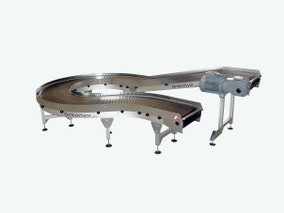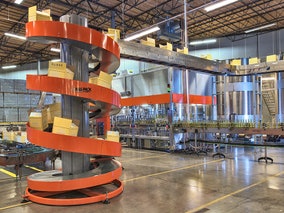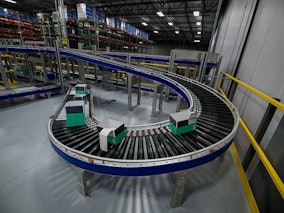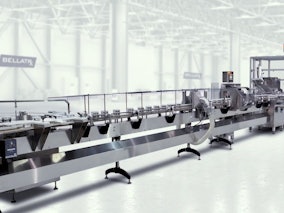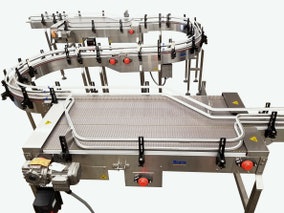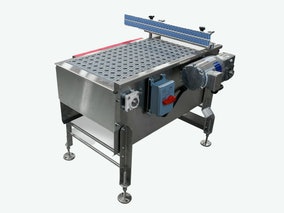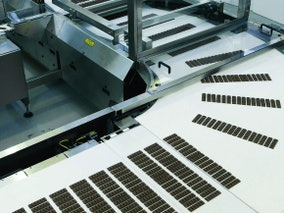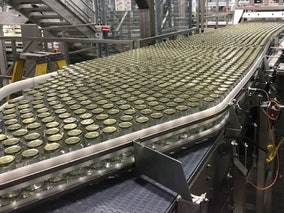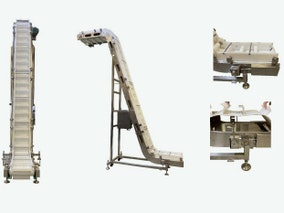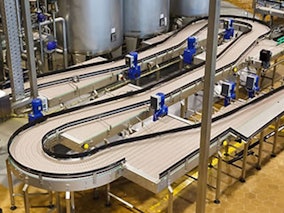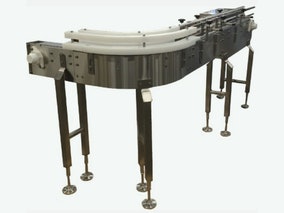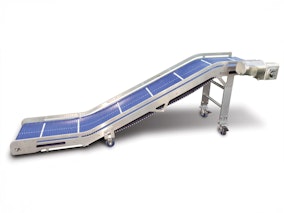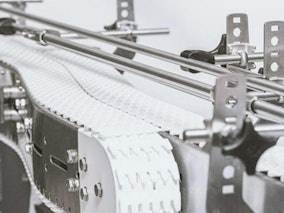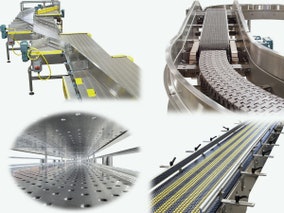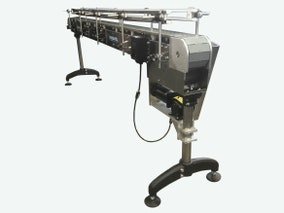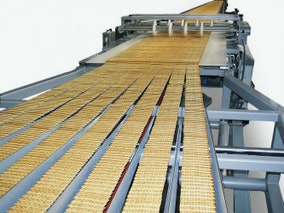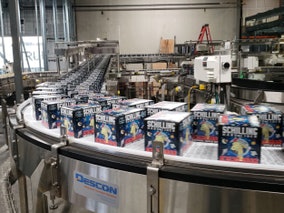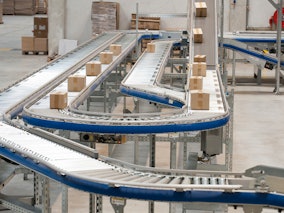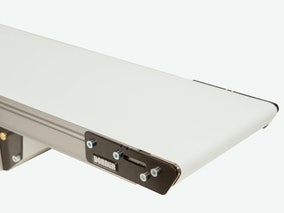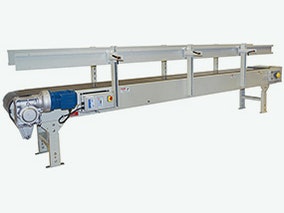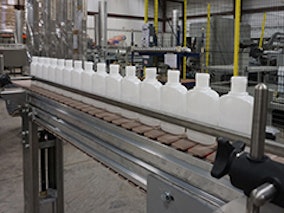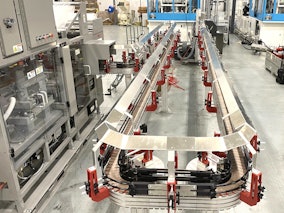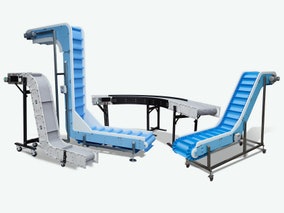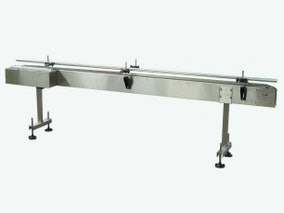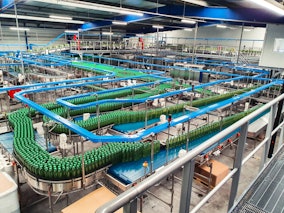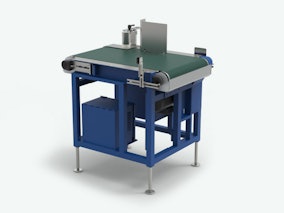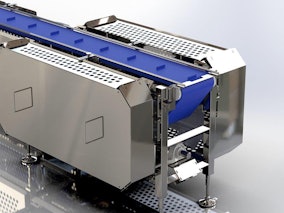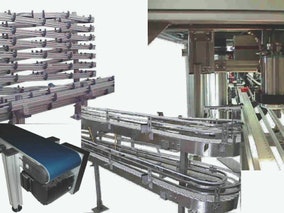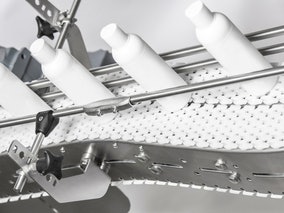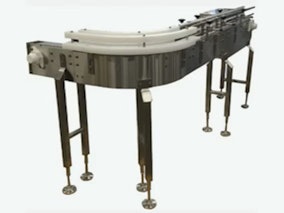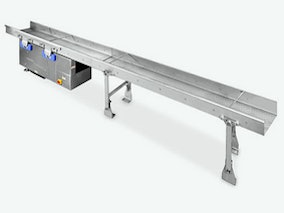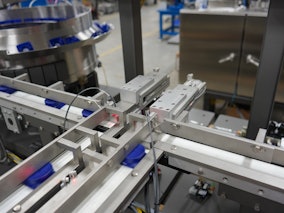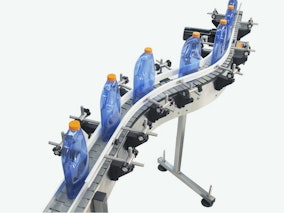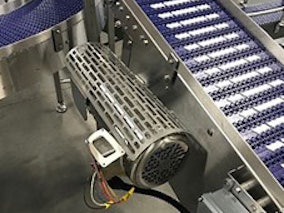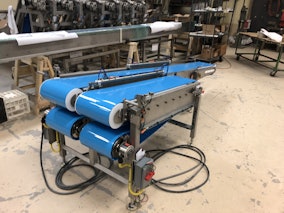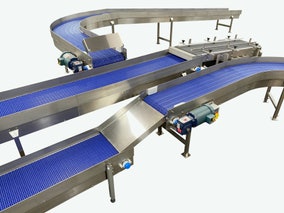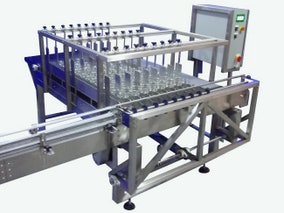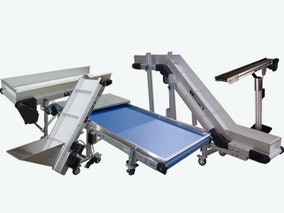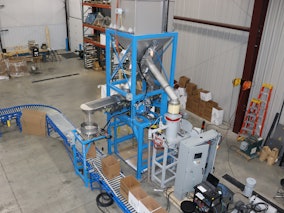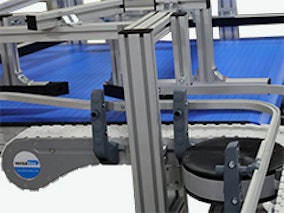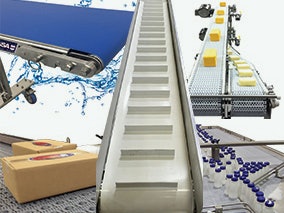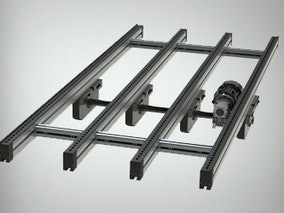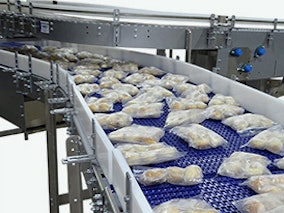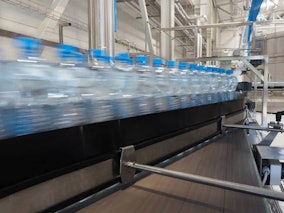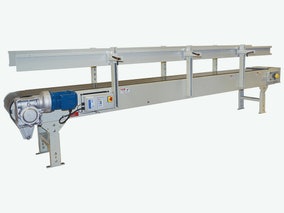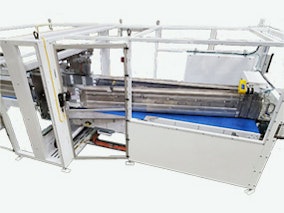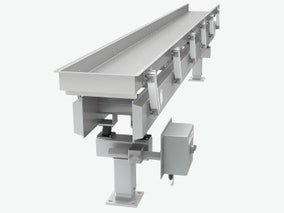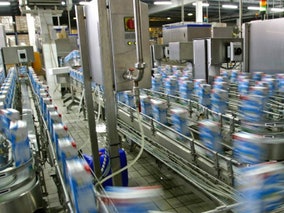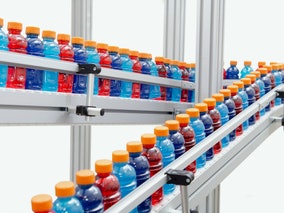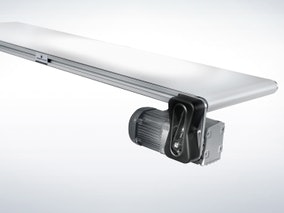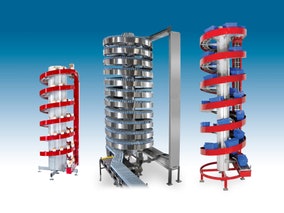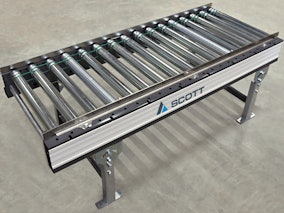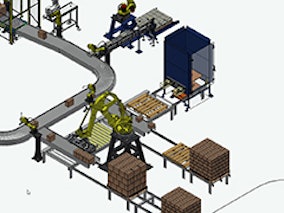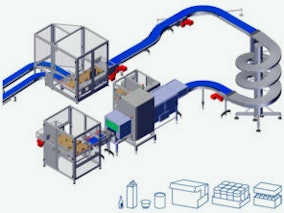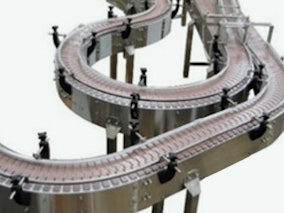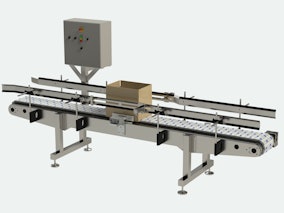Modular Conveyors
(69 companies)Modular conveyors, also known as modular belt conveyors, consist of attachable modules, often of plastic, that can be quickly linked together via joint rods and pins for quick reconfiguration on a conveying line as needed. Plan to purchase new conveying, feeding and handling equipment? Explore our articles to get tips.

ABM Equipment
ABM Equipment designs, builds, and integrates all types of conveyance systems from belt and screw to tubular drag and pneumatics.
You are currently not logged in
Acasi Machinery Inc
Acasi machinery manufactures standard conveyors for all its machines as well as custom conveyors for customers. Straight, curved, and custom tabletop conveyors are manufactured in stainless steel and have toolless guide rail adjustments. Acasi stocks 4.5-in. straight conveyors in 10-, 13-, 16- and 20-ft. lengths. Custom conveyors include 7.5- and 10-in. wide conveyors (other widths by request), L shape, U shape, S shape conveyors and any other curve configuration of virtually any length. Acasi also supplies raised, chemical resistant and sanitary conveyors.
You are currently not logged in
Accutek Packaging Equipment Co., Inc.
Accutek specializes in manufacturing customizable conveyor systems, available in both open top and closed top sanitary designs. Accutek conveyors can be tailored to fit any desired length or width, providing flexibility to meet specific requirements. Each conveyor is constructed using robust stainless steel materials, ensuring durability and longevity. Additionally, Accutek conveyors feature height adjustable stands and variable speed drives, allowing for precise control. Whether the customer needs an open top or closed top sanitary design, Accutek offers a wide range of lengths and widths to accommodate diverse needs.
You are currently not logged in
Advantage Conveyor, Inc.
Advantage Conveyor supplies a vast range of custom and modular conveying equipment for food and beverage, pharmaceutical, cosmetic and consumer industries. Machines include tabletop conveyors, singulating and combining conveyors, indexing conveyors, bucket conveyors, roller and ball transfer conveyors as well as a complete line of conveyor accessories such as gates, pushers, flow rails, guide rails and much more.
You are currently not logged in

Alstef Group
Alstef Group offers a full range of conveyor technology to move, sort, distribute, inspect, receive, ship, or inventory for e-commerce, food, pharmaceutical, and other industries. Sorting technology for applications ranging from small to high volume is integrated with Alstef Group's conveyor systems.
You are currently not logged in
AmbaFlex, Inc.
Ambaflex offers the AmbaVeyor modular conveyor system, featuring a sideways flexing belt that can perform upward and downward bends. Straight, inclined and curved tracks are possible in this one-drive conveyor system, which can extend over distances of up to 50 meters. The AmbaVeyor Curved Solutions series offers nine pre-assembled curved solutions that are available for integration into traditional conveyor lines facing complex conveying issues. Configurations are: straight, gooseneck, curve, u-shape, S-curve, hockeystick, helix, horseshoe and lightbulb.
You are currently not logged in
APS Packaging and Automation
APS Packaging & Automation designs and manufactures a wide range of conveyors for any kind of package. APS Packaging & Automation's product line includes conveyors featuring stainless steel frameworks, guide rails with a low friction coefficient and sensors that detect the presence of containers. The company can also optimize the flow of the containers to obtain a optimum feed to other packaging machines in the line.
You are currently not logged in
Ashworth Bros., Inc.
Ashworth Bros., Inc., headquartered in Winchester, Virginia, manufactures and services both metal and plastic conveyor belting for straight running, turn-curve, low-tension and self-stacking spirals.
You are currently not logged in

Auto-Mate Technologies LLC
CONVEYS-ALL® modular conveyor designs require no tools for adjustments. Standard components allow for simple in-house installation, reducing downtime and ensuring easy maintenance. Pre-assembled modules connect seamlessly, and the standard stainless steel frame eliminates issues with painted surfaces and non-sanitary systems. Each conveyor component can be mixed, matched, reconfigured, or added on as needed. These modular, cost-effective designs can be easily modified to meet future requirements. Competitively priced, CONVEYS-ALL conveyors feature high-quality materials and components, ensuring rugged construction, reliability, and long-term operation. All systems come with a 3-year guarantee. Off-the-shelf conveyor components can be shipped within 48 hours of order receipt. Depending on size, these modular pre-engineered conveyors come fully or partially assembled, with fully assembled systems broken down for crating purposes. Shipping options include common carrier or express service.
You are currently not logged in
Bastian Solutions
Bastian designs conveyor systems that replace manual transport processes, creating more reliable, ergonomic, and organized operations. Whether purchased as standalone pieces of equipment or as part of larger automated systems, Bastian Solutions conveyors increase throughput, relieve bottlenecks, and maximize the productivity of the labor force. Conveyors can help automate a variety of processes, including transporting, sorting, loading, unloading, palletizing, order fulfillment, and more.
You are currently not logged in
BellatRx Inc.
BellatRx manufactures raised bed sanitary design conveyors for easy cleaning and for avoiding entrapment areas. Conveyors feature oversized drive motors to ensure proper handling of heavy containers. Available in straight and flex versions for curved configurations. Design lines with 90-degree turns using curved sections or corner turntables for sharp turns. Automatic and manual set point guide rail setup is available to minimize changeover time.
You are currently not logged in
Bevco Sales International
Bevco conveyors are specialized for the food, beverage and consumer goods industries. Conveyor products, including tabletop, mat-top, air/pneumatic conveyor, and six-lane variety pack conveyors, are engineered to move containers and packages of various sizes along processing lines with maximum efficiency and reliability. Bevco offers custom designed conveyors to suit production needs of their customers.
You are currently not logged in

Boston Conveyor & Automation (An Mpac Group Company)
Boston Conveyor & Automation manufactures stainless steel conveyors that meet a wide range of industry standards, from wipedown construction for GMP and packaged product handling to fully welded sanitary conveyors for the most stringent USDA and EHEDG applications. Product line includes wipedown conveyors, washdown conveyors, sanitary conveyors and ultra sanitary conveyors. Product line accommodates belt types ranging from modular plastic to table top chain, fabric, homogenous, and wire belts. Boston Conveyor & Automation also offers switching conveyors for horizontal, multi-lane and vertical multi-lane applications.
You are currently not logged in
Bradman Lake Inc.
Bradman-Lake designs fully automatic distribution systems and row feed stations that offer flexibility in operation and are capable of accepting normal irregularities in the product itself and the product supply rate for food processing, candy processing and related applications. Engineered to handle delicate, sticky, friable and fractious products, Bradman-Lake’s Automatic Distribution Systems (ADS) are designed to effectively present product to the next stage of the wrapping cycle. Row feed stations are specifically developed for production and packaging lines. As each row is transferred onto the primary belt, they are conditioned by a pneumatic/servo row aligner, depending on speed.
You are currently not logged in
BW Packaging
BW Integrated Systems offers a broad range of conveyor systems that are manufactured to handle an array of products, including full and empty cans, bottles, cases, multi-packs, flexible products and more. Systems range from vacuum and air conveyance to traditional tabletop in both mass flow and single file configurations. BW Integrated Systems has over 50 years of conveyor, system control and line design experience.
You are currently not logged in
CAM Packaging Systems
Horizontal, vertical, incline and bucket conveyors are designed for a wide range of packaging applications. Co. also builds custom conveyors and carries standard sized conveyors. Featured conveyors include a bucket conveyor to move product from ground level up to the scale or counting system.
You are currently not logged in

CLE Can Lines Engineering
Can Lines Engineering (CLE) supplies conveyors used not only on can lines but in other food and beverage, pharmaceutical, dairy, nutraceutical and consumer packaged goods applications. Conveyor products include case conveyors; mat top and table top conveyors for trays and cans; sanitary goods conveyors; cable track conveyors for steel, aluminum or plastic containers; dual-chain gripper and elevator conveyors; magnetic bed conveyors and many other conveyor styles.
You are currently not logged in
CMCO Conveyance Solutions
Garvey supplies a wide range of conveyors designed to carry nearly any product and work well in nearly any packaging application. Featured conveyor models include the mat top conveyor, with belts providing long life, high impact resistance, easy cleaning and low maintenance. The GT series of table top conveyors can carry a wide variety of products at the widest variance of speeds and features a modular design that allows for easy and quick design and redesign on a packaging line. The Rx conveyor design implements a proactive approach to increase cleanliness, minimizing dirt pockets and maximizing rounded surfaces for better drainage.
You are currently not logged in
Coastal Manufacturing
Boost efficiency with Coastal Manufacturing’s custom stainless steel sanitary conveyors, engineered for food-safe processing and packaging. Coastal Manufacturing's stainless steel solutions are FSMA & USDA/FDA compliant, designed for durability, and feature easy cleaning and seamless integration into any production line.
You are currently not logged in
Coesia Group
Coesia supplies conveying systems through its Flexlink brand. Flexlink’s extensive product line includes plastic chain, modular belt, spiral conveyors and wedge conveyors. Flexlink offers nine different plastic chain conveyor systems (six aluminum and three stainless steel) with four sets of conveyor equipment for pallet systems (single and twin track). All are easy to assemble with standard hand tools to quickly get the chosen conveyor system up and running. Flexlink’s spiral elevating solutions work perfectly in filling and packing lines, in applications ranging from handling individual parcels or totes to items such as shrink-wrapped bottle packs or cartons.
You are currently not logged in

Container Handling Systems Corporation
CHSC conveyor systems offer a wide variety of design options to meet customer conveying needs. Products include table and mat top chain conveyor systems, air deck conveyors and Zone Touch zero pressure tabletop conveyors. CHSC also supplies cable conveyor systems for conveying metal cans. Related conveying systems include pressureless single filer systems as well as bi-directional and in-line flow accumulation tables.
You are currently not logged in
Deitz Company Inc.
Pharmafill conveyors by Deitz Company feature a sanitary design with stainless steel construction for filling and packaging pharmaceutical, nutrition, and other products. Modular design and adjustable height ensure exactly the proper size. Products include the Pharmafill BCV1 bottomless conveyor, which automatically holds bottles over a printer for bottom coding then transfers them back to the packaging line. This hugger belt conveyor enables printing on bottle bottoms without stopping, slowing or removing bottles from the packaging line.
You are currently not logged in
Delta Systems & Automation LLC
Delta Systems manufactures vibratory conveyors and infeed conveyor systems designed for applications including wrapping processed foods. Vibratory systems feed directly into the wrapper infeed or pre-group product to conveyors, allowing for subsequent and constant delivery to the wrappers through smart belt systems. Company’s row removal systems feature pass-through speeds in excess of 120 rows/min. and a delivery speed of 40 rows/min.
You are currently not logged in
Descon Conveyor Systems
Descon provides a complete suite of conveyor solutions for a range of applications, with a focus on the particular demands of the food and beverage industry. Featured systems include Descon’s full line of integrated case conveyors, designed for strength, rigidity and performance. Descon conveyor products also include plastic modular belting, low-back pressure type chains as well as accumulation and friction/non-friction top chains for braking.
You are currently not logged in

Dispac
Dispac offers a wide range of conveyors that handle bottles, cans, multipacks, cases and other packages. Tabletop conveyors are designed for the the efficient transfer of all types of materials or products. Conveyor styles include chain, plastic modular, roller, cable, magnetic, gravity, gripper conveyors and spiral styles.
You are currently not logged in
Dorner Mfg. Corp.
Dorner’s conveyors are designed to move product to the exact location, at the exact time and in the exact position it needs to be for the next phase of the production line. Products include 1100 Series of miniature conveyors, the 2200 Series of low profile, high performance fabric and modular belt conveyors, the 3200 Series heavy duty, low maintenance conveyors, and the 7x Series of sanitary conveyors designed to improve food safety. Designed for precision conveyance, conveyors feature in-house belting capabilities. Dorner conveyors are designed to easily integrate with robots, workers and equipment.
You are currently not logged in
Duravant
Duravant manufactures conveyors for every plant that handle applications ranging from upright bagging and turning/kicking, to conditioning, stacking and unique power curves.
You are currently not logged in
Dyco, Inc.
Dyco offers custom conveying solutions including extensive cable conveyor systems for many industries and the patented modular aluminum Red Line tabletop bottle conveyor, designed for long runs and minimized chain surging.
You are currently not logged in

Dyco, Inc.
Dyco tabletop conveyors are excellent for streamlining the transfer of materials or products. Dyco offers extensive tabletop conveyor experience and single-source fabrication, installation and service of systems it designs.
You are currently not logged in
Dynamic Conveyor Corporation
Conveyor solutions for food industry and manufacturing lines include belted conveyors, bucket conveyors, vertical Z conveyors, flighted belt conveyors, washdown conveyors, sanitary conveyors, raw food products conveyors, packaging conveyors and parts conveyors.
You are currently not logged in
E-PAK Machinery, Inc.
E-PAK variable speed conveyors are designed for various production needs of the end user and are available in a wide variety of lengths, widths, and construction materials and types for different packaging environments. Conveyors come in both straight and curved configurations (L, S, and U-shapes) to help end-users maximize their production proficiency and fit space requirements. Modular designs allow for adding complete conveyors or extensions to existing production lines. E-PAK also specialize in bi-flow and cooling conveyors.
You are currently not logged in
E2Pack USA
E2Pack USA provides a complete engineering services for the construction of conveying lines for empty, full and packaged PET, aluminum and tinplate cans, as well as empty, full and packaged glass containers and HDPE containers, bins, crates, cartons, trays, bundles and jerry cans, pouches and more. E2Pack USA lines use different types of conveying systems to guarantee the optimal solution based on the type of product processed, with production capacities ranging from 100 to 2000 containers per minute.
You are currently not logged in

EAM-Mosca Corporation
Complementing its line of strapping machines are specialty powered and gravity entry and exit conveyors. Conveyors feature controls to integrate production lines with strapping equipment as well as 90-degree transfer or bump turn options can rotate products for cross strapping or divert for storage or shipment. Conveyors and turning options can be fully integrated into an existing or new line.
You are currently not logged in
FEMC
FEMC offers a comprehensive range of premium conveyors, specially designed for food packaging and manufacturing automation. Their extensive selection of conveyor systems provides reliable and efficient solutions to streamline production processes while maintaining the highest standards of hygiene and safety. Conveyor solutions include flat belt conveyors, fixtured belt conveyors, and flighted belt conveyors. FEMC’s flat belt conveyors are engineered for versatility and ease of integration. Made from food-grade materials and featuring easily adjustable speed controls, these durable conveyors ensure smooth, continuous product flow in a wide range of food packaging applications, minimizing downtime and maximizing productivity. Fixtured belt conveyors are designed specifically for precision and accuracy in applications requiring precise product placement and orientation. Equipped with custom fixtures and adjustable guides, these conveyors guarantee gentle handling and optimal positioning of products, improving efficiency and reducing waste. FEMC’s flighted belt conveyors handle products with varying shapes and sizes. Featuring a series of cleats or flights, these conveyors securely transport items at inclines or declines without the risk of product spillage. Built with high-quality, food-safe materials, these conveyors maintain the integrity of products while ensuring a smooth, uninterrupted flow throughout.
You are currently not logged in
Flex-Line Automation Inc.
FlexLink tabletop conveyors are built of stainless steel and aluminum. Company also offers hygienic solutions, mK belt and chain conveyors, Titan heavy duty roller conveyors and more. Featured products include the FlexLink conveyor system, designed for flexibility of product handling for industries that require delicate handling for smaller, more sensitive products like pharmaceuticals, aerosol cans, personal care products and more.
You are currently not logged in
FlexLink Systems, Inc.
FlexLink offers a range of conveyor systems. Product line includes flexible conveyors, plastic chain conveyors, wide belt conveyors (WLX), automated assembly and material handling systems (aluminum conveyors and stainless steel conveyors, the X-Series). Pallet and puck conveyor handling systems permit efficient single piece flow solutions. Each can be adapted to varying environments.
You are currently not logged in

Garvey Corporation
Garvey supplies a wide range of conveyors designed to carry nearly any product and work well in nearly any packaging application. Featured conveyor models include the mat top conveyor, with belts providing long life, high impact resistance, easy cleaning and low maintenance. The GT series of table top conveyors can carry a wide variety of products at the widest variance of speeds and features a modular design that allows for easy and quick design and redesign on a packaging line. The Rx conveyor design implements a proactive approach to increase cleanliness, minimizing dirt pockets and maximizing rounded surfaces for better drainage.
You are currently not logged in
GlobalTek Equipment
GlobalTek Equipment makes a Raised Bed Sanitary Conveyor, designed to prevent bacteria growth caused by spills on the conveying line. It features a raised table top plastic belt, preventing the accumulation of debris underneath and enabling easy wipe-down maintenance and sanitation without disassembly. This unique design caters to the specific requirements of the food industry, ensuring compliance with food safety regulations. Additionally, it is suitable for chemical, nutraceuticals, pharmaceutical, and other industries with similar needs.
You are currently not logged in
Heat and Control, Inc.
Heat and Control distributes Fastback conveyors with configurations designed to help customers transfer, lift vertically, convey long distances, and even decline product in a controlled manner.
You are currently not logged in
Hoosier Feeder
Hoosier Feeder Company offers a full line of conveyors to fit the application from robust and durable conveyors for heavy parts or light, flexible conveyance for high-speed applications. Platforms include belt, modular chain, wash-down food grade, and chain conveyors.
You are currently not logged in

ICON Robotics
ICON Robotics' JMP Engineering division is much more than an integrator of robots. JMP designs, engineers and manufactures most of the components that make up its systems. Whether for handling small lightweight items at ultra-high speeds or large cumbersome products, JMP Engineering can design and manufacture a conveying system that is efficient, easy to operate, and requires little maintenance.
You are currently not logged in
Kaps-All Packaging Systems, Inc.
Kaps-All supplies CONVEYS-ALL® modular conveyor designs that require no tools for adjustments. Standard components are used for simple and complete in-house installation eliminating expensive downtime and ensuring easy maintenance. The pre-assembled modules are easily connected together, offering flexibility of use as each conveyor component can be mixed, matched, reconfigured or added-on when needed. The standard stainless steel frame eliminates painted surfaces, aluminum extrusions and crudely welded non-sanitary systems on the market. CONVEYS-ALL conveyors are competitively priced and feature high quality materials and components, along with rugged construction, reliability and longevity of operation. All conveyor systems are guaranteed for 3 years. "Off-the-shelf" conveyor components can be shipped within 48 hours upon receipt of order.
You are currently not logged in
Keenline Conveyor Systems, LLC
Keenline offers a line of super-sanitary designed conveyors for handling raw food and raw materials. In addition to its standard stainless steel conveyor lines, Keenline offers these custom designed conveyors to meet all raw food and food conveyance needs. Keenline builds a wide range of z-incline and z-decline conveyors that are easy to clean and clean in place products. USDA, FDA, 3A, meat, dairy, etc.) are all available design specifications upon request.
You are currently not logged in
KOALD
KOALD Design is a full service engineering firm offering a complete spectrum of solutions for process and packaging systems in the food and beverage, pharmaceutical, cosmetic and medical manufacturing industries, including product and package conveyors, including bucket conveyors, incline conveyors, flighted conveyors and more.
You are currently not logged in

Laughlin Conveyor
Laughlin Conveyor offers a variety of conveyor system solutions for nearly every industry and application. Laughlin offers modular plastic belt conveyors, table top chain conveyors, composition belt conveyors, rod style metal belt conveyors, driven and gravity roller conveyors among other types.
You are currently not logged in
Liquid Packaging Solutions, Inc.
Liquid Packaging Solutions manufactures conveyors for bottle transfer, loading, laning, accumulating and more. Conveyor line height, width, material and other construction components will be matched to the project at hand.
You are currently not logged in
MAC Automation Concepts
MAC Automation Concepts manufactures aluminum, stainless steel and powder-coated steel conveyors. Product line includes belt conveyors, roller conveyors, hopper conveyors, curved conveyors in low-profile, incline, horizontal incline, Z-style, and other styles.
You are currently not logged in
Material Transfer & Storage Inc.
Material Transfer specializes in the design and manufacturing of advanced integrated bulk material handling systems fit with custom conveying systems. In addition, they offer specialized services such as pallet dispensing and slip sheet dispensing to meet a wide range of material handling needs.
You are currently not logged in

mk North America, Inc.
mk North America provides a wide selection of standard and custom conveyors, as well as a full line of factory equipment, from chain and cleated belt conveyors to flat belt and modular plastic belt conveying systems. Company also offers conveyor engineering design services to help both end-users and integrators serve their industry requirements.
You are currently not logged in
Multi-Conveyor
Multi-Conveyor makes standard and custom conveyors designed to meet or exceed application requirements, while saving critical floor space in the process. Company helps its customers accumulate, rotate, elevate, integrate, lift-gate, incline, combine, decline, and alpine packages. Conveyors are engineered for inline, sanitary, standard, hand-pack, and custom jobs to grip, flip, split, invert, divert, merge, twist, turn, curve, transfer, push, stack, and move products in serpentine patterns, among other capabilities.
You are currently not logged in
NCC Automated Systems
Glide-Line by NCC Automated Systems offers a comprehensive range of conveyors developed for product and package handling as well as automation integrators. From precision timing-belt transport to heavy-duty roller-chain pallets and multi-axis motion cells, the conveyors are engineered to adapt to virtually any layout challenge. Offerings include precision timing-belt conveyors in single-, dual-, and multi-strand configurations; heavy-duty roller chain conveyors for large workpieces; and the modular Glide-Line 360 system for flexible movement, sorting, and elevation. Additional options include FlexMove conveyors for multi-level transport and zero-contact zoned conveyors and vertical transport units for damage-free handling. These modular, configurable solutions enable efficient material flow, reduced downtime, and reliable performance across a variety of automation layouts.
You are currently not logged in
Nercon Conveyor Systems
Nercon’s line of conveyors will move end-user products up or down, side to side, in addition to accumulating, rotating and turning. The ProCore® conveyor line features different types of conveyor systems and packaging equipment, including mat top, tabletop and belt conveyor systems. Manufactured in-house for fast delivery and installation onto factory floors, ProCore® conveyors are extensively tested for increased up-time performance. All ProCore® models are built with a standard base of equipment that allows it to be modified for customer preferences, making it a hybrid between standard “one-size-fits-all” and a custom product. Nercon also offers HydroCore® hygienic clean-in-place (CIP) conveyors and sanitary clean-out-of-place (COP) conveyor systems, designed and manufactured for efficiency, fewer repairs, less time between product changeovers, more uptime and increased profit margins. Sanitary Z incline conveyor and washdown spiral are engineered to help meet today’s stringent sanitary standards while still optimizing production operations.
You are currently not logged in

Newmapak Ltd.
Newmapak offers a comprehensive range of Vetromeccanica conveyors, designed to optimize production lines across industries like food and beverage, wine and spirits, personal care, and more. These include air conveyors for lightweight empty containers, chain conveyors for stable transport, vacuum conveyors for precise movement. Vetromeccanica's modular conveyor designs accommodate various container shapes and materials, making them suitable for diverse production needs.
You are currently not logged in
nVenia, a Duravant Company
nVenia designs and builds conveyors for every plant. From upright bagging and turning/kicking, to conditioning, stacking and unique power curve applications, nVenia conveyors are designed for fast and cost-effective bag handling.
You are currently not logged in
Pack Air Inc.
Pack Air offers conveying solutions for a wide range of industries, including paper/tissue/non-wovens, food and beverage, CPGs, health and hygiene, warehousing and distribution, end-of-line, industrial and specialty, and industrial controls. Their product portfolio encompasses conveyor systems with mild steel, plastic, and stainless steel construction options, along with belts in various materials like fabric, rubber, and modular plastic. Pack Air also supplies air conveyors, zero tangent modular belts, and custom-fabricated solutions, as well as control systems, specialty devices, and controls for conveyors.
You are currently not logged in
Pineberry Manufacturing
Pineberry Manufacturing supplies flat belt conveyors, vacuum conveyors, and lug conveyors engineered for consistent, high-speed product transport of packages. These systems are built to support a wide range of product types and packaging applications. Engineered for reliability and precision, Pineberry’s conveyors can be customized to meet specific production requirements, including indexing, spacing, and orientation. Whether used for standalone transport or integrated with other automation systems, Pineberry’s conveyor solutions help optimize material flow, reduce manual handling, and support continuous operation.
You are currently not logged in

PPM Technologies Holdings LLC, a Duravant Company
PPM offers a variety of conveyor types for the food-processing industry, ranging from belt conveyors to electromagnetic vibratory, mechanical, and horizontal motion types.
You are currently not logged in
Precision Automation Company, Inc.
Precision Automation Company integrate conveyors from suppliers including Hilmot LLC, Roach Conveyors, TGW Conveyor Systems, Span Tech Conveyors and Daifuku Wynright. Range of conveyors are designed for a wide variety of products: cases, bottles, cans, pallets, drums, containers and more. Areas of expertise include sanitary food and beverage handling, conveyor systems for shipping applications, carton and case handling, and individual product conveying for food, beverage, pharmaceutical and consumer products. The process starts with the investigation and understanding of the customer’s needs. Precision Automation manages the entire conveyance project with thorough analysis, all the way through installation and training.
You are currently not logged in
QC Conveyors, a Duravant Company
Conveyors for a wide variety of applications include modular plastic chain conveyors and belt conveyors, for washdown and heavy duty applications. Product line also includes tabletop and magnetic conveyors and beyond. Conveyors handle speeds up to 416 fpm and loads up to 800 lb. and widths from 2- to 48 in.
You are currently not logged in
Rexfab
Rexfab offers conveyor solutions for the entire production line. Rexfab can help automate high-volume production lines in the baking and food industries. Conveyor solutions are designed to meet all production and sanitary requirements. They feature stainless-steel construction for resilience and ease of cleaning, and modular plastic belting with a variable AC gear motor for optimal performance.
You are currently not logged in

Robotunits Inc.
Robotunits offers a wide variety of standard and custom conveyors with short lead times, including belt, modular belt, powered roller, transfer unit, turntable conveyors in addition to conveyor technology accessories and side guide systems. The variable Robotunits Lift Station enables the energy-efficient transport of products on two levels within industry and production areas, with standard conveying heights up to 5 m.
You are currently not logged in
Ryson International Inc.
Ryson supplies vertical spiral conveyors, which need less floor space than conventional conveyors and are also faster and more reliable than any elevator or lift. Central to their design is Ryson’s proprietary slat-style belts designed with rolling friction without any sliding movements or wear strips. This facilitates a small footprint, high speed, low noise, low maintenance and a long life. Ryson Spirals are available in powder coated carbon steel, stainless steel, hybrid and freezer versions.
You are currently not logged in
Scott Automation
Scott Automation provides a wide range of case conveyor systems for efficient handling of unit loads in material handling and logistics operations. Their offerings include belt, slat-chain, modular belt, and roller conveyors for horizontal and inclined transport, designed to perform reliably even in demanding environments such as cold storage or dusty facilities. For vertical movement, they offer slanted conveyors, spiral conveyors, index elevators, and platform elevators. The modular conveyor range features EvoLink control technology, enabling fast reconfiguration, real-time monitoring, and smart Industry 4.0 connectivity. EvoLink modules handle loads up to 50 kilograms and operate quietly on 24V DC, with easy maintenance and quick module replacement to reduce downtime and support flexible, high-efficiency production lines.
You are currently not logged in
Shrink Tech Systems
Shrink Tech Systems presents three distinct conveyor solutions – the STS Lugged Conveyor, the STS Belted Conveyor, and the STS Plastic Table Top Chain Conveyor. The STS Lugged Conveyor offers a robust lugged style or flight bar design with all-steel construction, powder coating, and a stainless steel top for durability. It features AC variable speed control, integrated wrapper control, and stand-alone control options. The standard length is 5 feet, but it can be customized to meet specific length requirements, along with options for stainless steel construction and voltage preferences of 120 or 230 volts. The STS Belted Conveyor is an FDA-compliant model with a rigid back guide and similar construction features as the lugged conveyor, along with several customization options. The STS Plastic Table Top Chain Conveyor comes with FDA modular belts and is built to order.
You are currently not logged in

Span Tech, LLC
Span Tech LLC designs durable plastic chain conveyors and material handling solutions. Span Tech develops unique, customizable technical solutions for processing applications in core industries that include: food production, beverage production, manufacturing, packaging, distribution, cosmetics, pharmaceuticals, and e-commerce. Vast conveyor line includes standard curving and straight conveyors, incline conveyors, changing elevation topper lifts, spiral elevators, twist conveyors, microspan and wire mesh belt transfer conveyors, conveyor components, guide rails, conveyors for metal detector systems and much more.
You are currently not logged in
Standard-Knapp, Inc.
Standard-Knapp designs custom stainless steel conveyors for seamless material flow in both wet and dry packaging environments. Built for continuous operation, these conveyors feature modular and flat top chains, rollers, and belts, with options for vertical conveying and automatic adjustments. The 496 Triangular Conveyor, for example, optimizes product stability during transitions. Engineered for flexibility and future expansion, these systems use high-quality gear motors with frequency converters and soft start features for enhanced performance and reliability.
You are currently not logged in
Tessera Group Inc.
George A. Wright, a Tessera Group company, specializes in the design, manufacture and integration of customized specialty stainless steel conveyor systems, secondary product handling conveyors, CDLR roller conveyors, and 24 V DC roller conveyor systems.
You are currently not logged in
TORFRESMA USA LLC
Torfresma manufactures hygienic and non-hygienic conveyor systems. Hygienic conveyor systems are utilized in fabrication and fully washdown areas in food facilities. These conveyors come standard with CIP (clean-in-place) capability and have a robust design. Non-hygienic conveyors are utilized in secondary processing areas for companies in the food and consumer goods industries. Torfresma also has a wide variety of sorters in its portfolio to transfer cases 90 degrees or 30 degrees. Torfresma conveyors utilize rollers and belting depending on the application.
You are currently not logged in

Trepko Inc.
Trepko offers conveyor systems featuring the TRAD slat belt system, which serves a wide range of functions in the food, techno chemical, and pharmaceutical industries. The conveyor is suitable for lightweight products and operates vertically, horizontally, or diagonally, with variable speed tailored to each application. Engineered for high efficiency, durability, and minimal maintenance, it proves ideal for challenging environments while ensuring easy accessibility. The conveyor system is modular, comprising drive units, straights, curves, elevations, legs, and guide rails, rendering it highly adaptable.
You are currently not logged in
WeighPack Systems, Inc. / Paxiom
WeighPack manufactures a range of different types of conveyors for turnkey system integrations to help products dispense into packaging machines, containers or accumulation rotary tables. WeighPack’s container indexing conveyor is designed to automatically index and fill rigid containers including clamshells, bottles, jars and cans. Easily integrated with any filling device, the indexing conveyor features adjustable guide rail, a pneumatic indexing mechanism, an AC variable speed drive, container positioning sensors, no container/no fill features and more. WeighPack’s box indexing conveyor is designed for automatically indexing and filling corrugated boxes, trays and rigid containers, and can be integrated with any filling device. The exit conveyor, featuring a 304 stainless steel construction and a KB drive, is engineered to integrate with any automatic bagging machine to carry product from ground level to a rotary table or the operator.
You are currently not logged in
Report an Issue
Incorrect/inaccurate categorization? Report inaccuracies or problems »
Related Conveyors searches
More on Modular Conveyors
Explore the functionality, uses, and benefits of modular conveyors, which feature attachable modules for quick reconfiguration, enhancing flexibility and efficiency in various applications.
Modular conveyors, often referred to as modular belt conveyors, are designed with detachable modules typically made of plastic. These modules can be swiftly connected using joint rods and pins, allowing for rapid adjustments and reconfigurations along the conveying line. This adaptability makes them suitable for environments where production needs frequently change or where different products are handled during various stages of the manufacturing and packaging process.
The operation of modular conveyors involves a series of interlocking plastic modules, which are connected by rods that allow for both straight runs and variable curves. This flexibility is crucial in navigating the complex layouts of modern production facilities. The belts can be easily lengthened or shortened, and curves can be adjusted to accommodate new production layouts or to optimize existing processes. The ease of assembly and reconfiguration means that these conveyors can be adapted on-the-fly without significant downtime.
Modular conveyors are utilized in a variety of settings, from food processing to pharmaceuticals, and from packaging to general manufacturing. Their ability to quickly adapt to different tasks makes them particularly valuable in industries where production lines frequently shift. For instance, in the food industry, these conveyors can be used for moving products through different stages of processing and packaging, adapting to various sizes and shapes of products. Similarly, in pharmaceuticals, they ensure gentle handling of sensitive products through precise control of conveyor layouts.
One of the primary benefits of using modular conveyors is their versatility. The ability to modify conveyor routes and configurations without extensive downtime is a significant advantage in rapidly changing industrial environments. Additionally, the plastic modules are easy to clean and maintain, which is especially important in industries requiring high standards of hygiene. Another advantage is the durability of the modules, which are resistant to corrosion and wear, reducing the need for frequent replacements and maintenance.
For professionals seeking to enhance operational efficiency and adaptability in their conveying systems, exploring the range of modular conveyors available can be highly beneficial. PMMI's ProSource directory offers a comprehensive list of suppliers and manufacturers specializing in these systems, providing a valuable resource for comparing options and finding the right solutions to meet specific operational needs.
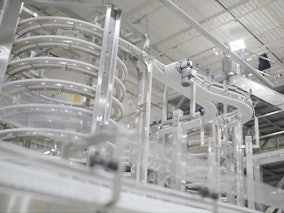
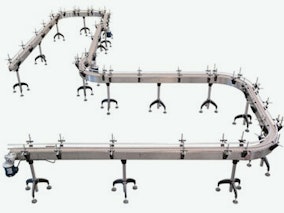
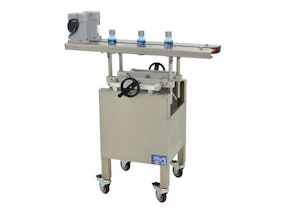
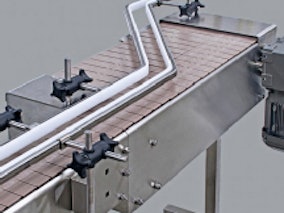
%20-%20Conveyors.jpg?ixlib=js-3.5.1&auto=format%2Ccompress&q=70&w=284&h=213&fit=crop)
